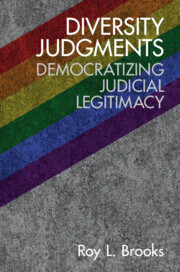Book contents
- Diversity Judgments
- Diversity Judgments
- Copyright page
- Dedication
- Contents
- Preface
- Acknowledgments
- Introduction
- Part I Asian Americans
- Part II African Americans
- Part III Women
- 6 Roe v. Wade (Reproductive Rights)
- 7 United States v. Virginia (Single-Sex Colleges)
- 8 United States v. Morrison (Violence Against Women)
- 9 Kulko v. Superior Court (Child Custody or Support)
- Part IV Latinx
- Part V Native Americans
- Part VI LGBTQ
- Part VII Intersectionality
- Part VIII Outsiders v. Outsiders
- Part IX White Males
- Part X Situational Outsiders
- Index
7 - United States v. Virginia (Single-Sex Colleges)
from Part III - Women
Published online by Cambridge University Press: 10 March 2022
- Diversity Judgments
- Diversity Judgments
- Copyright page
- Dedication
- Contents
- Preface
- Acknowledgments
- Introduction
- Part I Asian Americans
- Part II African Americans
- Part III Women
- 6 Roe v. Wade (Reproductive Rights)
- 7 United States v. Virginia (Single-Sex Colleges)
- 8 United States v. Morrison (Violence Against Women)
- 9 Kulko v. Superior Court (Child Custody or Support)
- Part IV Latinx
- Part V Native Americans
- Part VI LGBTQ
- Part VII Intersectionality
- Part VIII Outsiders v. Outsiders
- Part IX White Males
- Part X Situational Outsiders
- Index
Summary
The Virginia Military Institute (VMI), a public military college “financially supported by Virginia and ‘subject to the control of the [Virginia] General Assembly,’” was founded in 1839. VMI has the “distinctive mission” to turn students into “citizen-soldiers” who are “prepared for leadership in civilian life and in military service” through an “adversative method.” The adversative method requires VMI cadets to “live in spartan barracks where surveillance is constant and privacy is nonexistent,” wear uniforms, eat communally, and perform drills. The model subjects new students to constant torment and punishment in the “rat line” and relies on a strictly enforced honor code. While VMI’s academic choices in liberal arts, sciences, and engineering mirror the choices available at other Virginia public schools, the adversative method has created a noticeable loyalty among VMI alumni that has led VMI’s endowment to be “the largest per-student endowment of all public undergraduate institutions in the Nation.” A product of its nineteenth-century founding, VMI only admitted men and thus remained the only single-sex school and the only public school using the adversative method in Virginia by the 1990s.
- Type
- Chapter
- Information
- Diversity JudgmentsDemocratizing Judicial Legitimacy, pp. 195 - 210Publisher: Cambridge University PressPrint publication year: 2022

